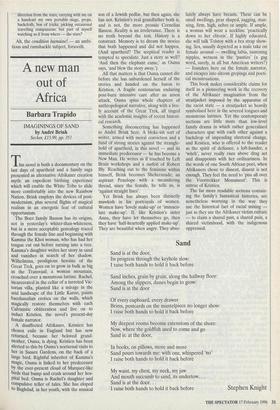A new man out of Africa
Barbara Trapido
IMAGININGS OF SAND by Andre Brink Secker, £15.99, pp. 351 his novel is both a documentary on the last days of apartheid and a family saga presented as alternative Afrikaner creation myth: an expedient birthing experience which will enable the White Tribe to slide more comfortably into the new Rainbow Nation. Brink employs the devices of post- modernism, plus several flights of magical realism in an energetic feat of cultural opportunism.
The Boer family Basson has its origins, not in yesterday's whiter-than-whiteness, but in a more acceptable genealogy traced through the female line and beginning with Kamma the Khoi woman, who has had her tongue cut out before turning into a tree. ICamma's daughter writes her story in sand and vanishes in search of her shadow. Wilhelmina, prodigious heroine of the Great Trek, goes on to grow in bulk as big as the Transvaal; a woman mountain, crouched over a monstrous latrine. Rachel, incarcerated in the cellar of a turreted Vic- torian villa, planted like a mirage in the arid landscape of the Little Karoo, paints bacchanalian erotica on the walls, which magically restore themselves with each Calvinistic obliteration and live on to induct ICristien, the novel's present-day female narrator.
A disaffected Afrikaner, ICristien has chosen exile in England but has now returned, because her beloved grand- mother, Ouma, is dying. ICristien has been alerted to this by Ouma's nocturnal visits to her in Sussex Gardens, on the back of a large bird. Rightful inheritor of Kamma's magic, Ouma is linked to her predecessor by the ever-present cloud of Marquez-like birds that bump and crash around her hos- pital bed. Ouma is Rachel's daughter and compulsive teller of tales. She has eloped to Baghdad, in her youth, with the musical son of a Jewish pedlar, but then again, she has not. ICristien's real grandfather both is, and is not, the more prosaic Cornelius Basson. Reality is an irrelevance. There is no truth beyond the text. History is a construct. Memory is to dream the stories that both happened and did not happen. (And apartheid? The sceptical reader is tempted to speculate. Just a story as well? 'And then the elephant came,' as Ouma says, 'and blew the story away.') All that matters is that Ouma cannot die before she has unburdened herself of the stories and handed on the baton to Kristien. A fragile centenarian enduring post-burn intensive care after an arson attack, Ouma spins whole chapters of anthropological narrative, along with a live- ly account of the Great Trek, all tinged with the academic insights of recent histori- cal research.
Something disconcerting has happened to Andre Brink here. A bloke-ish sort of writer, armed with moral conviction and a fund of strong stories against the strangle- hold of apartheid, in this novel — and its immediate predecessor — he has become a New Man. He writes as if touched by Left Brain workshops and a surfeit of Robert Bly. Reaching out to the feminine within himself, Brink becomes Sheherazade; an aspirant Penelope with a meandering thread, since the female, he tells us, is 'against straight lines'.
Yet Brink has always been distinctly mawkish in his portrayals of women. Women have 'lovely make-up' or 'immacu- late make-up'. If, like Kristien's sister Anna, they have let themselves go, then they have 'half-heartedly applied make-up'. They are beautiful when angry. They abso- lutely always have breasts. These can be small swellings, pear shaped, sagging, stun- ning, firm, high, ochre or ample. If ample, a woman will wear a neckline 'practically down to her clitoris'. If highly educated, she will talk Tolstoy with a bra strap show- ing. Sex, usually depicted as a male take on female arousal — swelling labia, tautening nipples, wetness in the 'panties' (a gag word, surely, in all but American writers?) — founders here on the female narrator, and escapes into sitcom gropings and poeti- cal menstruations.
This book makes considerable claims for itself as a pioneering work in the recovery of the Afrikaner imagination from the straitjacket imposed by the apparatus of the racist state — a straitjacket so heavily symbolised here in the severed tongues and monstrous latrines. Yet the contemporary sections are little more than low-level family drama in which rather generalised characters spar with each other against a backdrop of impending electoral change, and ICristien, who is offered to the reader as the spirit of defiance, a left-hander, a 'witch', never really rises above drag act and disappoints with her ordinariness. In the words of one South African poet, when Afrikaners chose to dissent, dissent is not enough. They feel the need to 'piss all over the Voortrekker Monument'. This is untrue of ICristien.
The far more readable sections contain- ing the family's fantastical histories, are nonetheless worrying in the way they use the historical fact of racial mixing — just as they use the Afrikaner victim culture — to claim a shared -past, a shared pain, a shared victimhood, with the indigenous oppressed.


























































 Previous page
Previous page